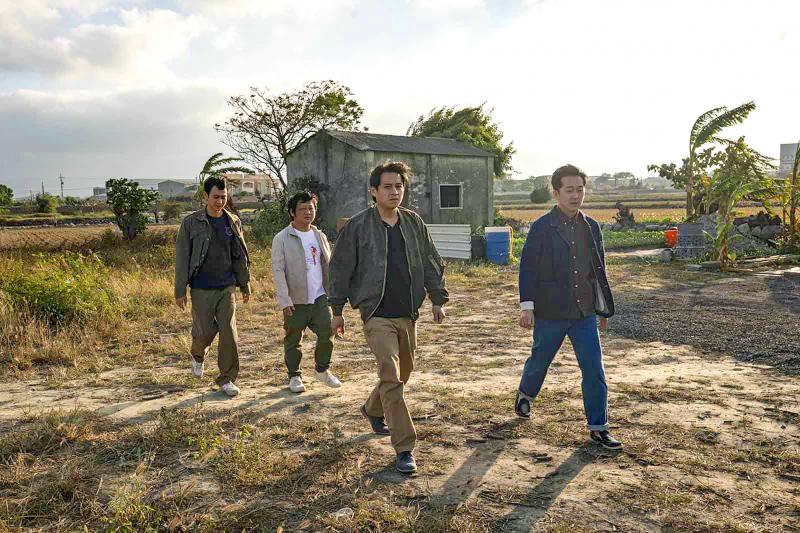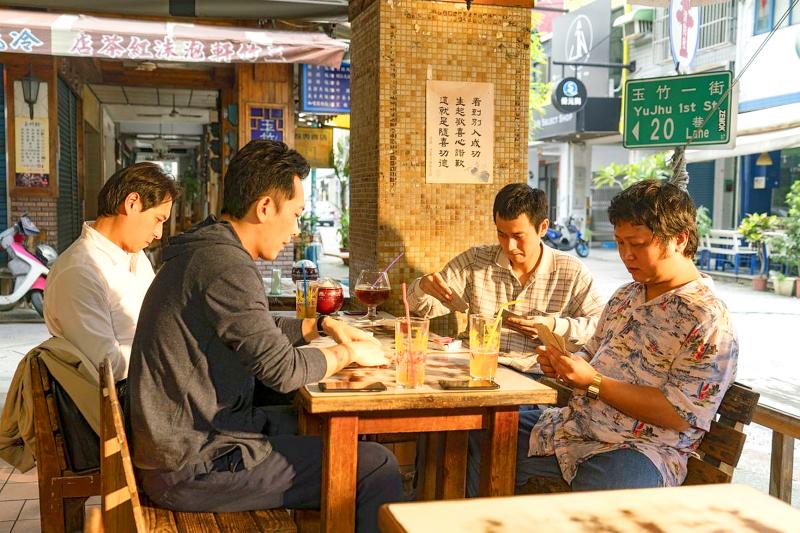Director Huang Hsin-yao (黃信堯) continues his irreverent, absurd commentary of the mundane struggles of ordinary people in Classmates Minus (同學麥娜絲), his second feature after breaking onto the scene with 2017’s The Great Buddha+ (大佛普拉斯).
Classmates Minus won the Audience Choice Award at last week’s Golden Horse Film Festival, and is even more relatable to local viewers than The Great Buddha+ as it literally just follows the lives of four high school buddies in their forties who live in the same small southern town they grew up in.
Huang plays himself in the film, a director who is shooting his next project after finding success with The Great Buddha+. He provides the same cynical yet humorous narration reminiscent of traditional Taiwanese storytellers throughout the film to tie everything together, adding to the surrealness by breaking the fourth wall at times to converse with the characters. At one point, he even hilariously explains to the audience why he cast the same actor in three roles. This narrative role is crucial to the pace and depth of the story, especially as many things are left unsaid with such male friendships.

Photo courtesy of Applause Entertainment
The antics do go over the top in some scenes and verge into tomfoolery, but overall the film presents the right amount of biting satire and silly laughs to keep the audience entertained while getting Huang’s vision across. Despite the loaded cinematic devices, the events and characters are very much rooted in reality, even painfully so, but life is more palatable when it’s not taken too seriously.
On the cusp of entering middle age, the four BFFs all suffer from missed opportunities of some sort and struggle to make sense of where they stand in the world. Their youthful optimism and unbridled energy is long gone, but they’re still grasping for a better life and have something to prove before they get too old. This sentiment speaks to audiences of all ages, albeit strictly from a male perspective as the female characters are presented mostly as mere accessories. Yes, it’s a story specifically pertaining to Taiwanese men in their forties, but handling the women in their lives with more nuance would actually add to the overall picture.
The danger of making a film that tries to tell the stories of multiple leads is that it either focuses too much on one or two characters, or fails to dig deep enough to present a convincing picture of any of them. But Huang makes it work here, as all four leads are quite fleshed out with distinct experiences that are more or less equally relatable to the viewers.

Photo courtesy of Applause Entertainment
Cheng Jen-shuo (鄭仁碩) plays Dianfeng, a hard-working insurance salesman who keeps missing out on promotions and worries if he’ll be able to take care of his girlfriend and unborn child. Liu Kuan-ting (劉冠廷) portrays Blockage, who suffers from severe stuttering and makes paper effigies for a living, and who missed out on romance due to his job and devotion to caring for his grandmother. Nadow (納豆) channels his usual unconfident, unattractive but endearing persona into Guantou, who is recovering from a suicide attempt. He runs into his high school crush again through his new job, and struggles with how to proceed since she has become a sex worker. Finally, Shih Ming-shuai (施明帥) portrays A-tian, a small time director who missed the grand lottery by one number. After a chance encounter, he finds himself suddenly a political pawn who is pushed into running for legislator.
The four regularly gather at a tea shop to play cards and smoke cigarettes — which is where their lives mainly intersect, although they also help each other out when one is in need. Their lives may be jumbled and confusing but they’re all straightforward, likeable fellows whose lives didn’t turn out how they wanted — and beneath the film’s wackiness and relentless societal parody is permeating sadness and despair that lingers long after the laughter ends.
Not getting his big break until the age of 44, Huang should understand the film’s sentiment the best, and even after he became a household name he notes in the opening that his life didn’t change that much.
But as the film suggests, what can one do about life besides poke fun at it and soldier on?

Taiwan has next to no political engagement in Myanmar, either with the ruling military junta nor the dozens of armed groups who’ve in the last five years taken over around two-thirds of the nation’s territory in a sprawling, patchwork civil war. But early last month, the leader of one relatively minor Burmese revolutionary faction, General Nerdah Bomya, who is also an alleged war criminal, made a low key visit to Taipei, where he met with a member of President William Lai’s (賴清德) staff, a retired Taiwanese military official and several academics. “I feel like Taiwan is a good example of

March 2 to March 8 Gunfire rang out along the shore of the frontline island of Lieyu (烈嶼) on a foggy afternoon on March 7, 1987. By the time it was over, about 20 unarmed Vietnamese refugees — men, women, elderly and children — were dead. They were hastily buried, followed by decades of silence. Months later, opposition politicians and journalists tried to uncover what had happened, but conflicting accounts only deepened the confusion. One version suggested that government troops had mistakenly killed their own operatives attempting to return home from Vietnam. The military maintained that the

Jacques Poissant’s suffering stopped the day he asked his daughter if it would be “cowardly to ask to be helped to die.” The retired Canadian insurance adviser was 93, and “was wasting away” after a long battle with prostate cancer. “He no longer had any zest for life,” Josee Poissant said. Last year her mother made the same choice at 96 when she realized she would not be getting out of hospital. She died surrounded by her children and their partners listening to the music she loved. “She was at peace. She sang until she went to sleep.” Josee Poissant remembers it as a beautiful

Before the last section of the round-the-island railway was electrified, one old blue train still chugged back and forth between Pingtung County’s Fangliao (枋寮) and Taitung (台東) stations once a day. It was so slow, was so hot (it had no air conditioning) and covered such a short distance, that the low fare still failed to attract many riders. This relic of the past was finally retired when the South Link Line was fully electrified on Dec. 23, 2020. A wave of nostalgia surrounded the termination of the Ordinary Train service, as these train carriages had been in use for decades